Issue Number 43, Winter 2018-19
Contents
- Spy Pond: Arlington, Massachusetts by Ed Meek
- White Mare by Gigi Marks
- The Day Titanic Drowned by Tom Sheehan
- Particulate Matter by Molly Fisk
- Rain by Rachel Rose Teferet
- Back from the Brink by Kathe Palka
- First Snowfall, Taos by Devreaux Baker
- The Animals Are Talking by Grant Jones
- Geese by Robert Fillman
- Weather Station on the Coast by Ann Spiers
- Humble Homily by Michael Lyle
- Impenetrable by Ellie Rogers
- Inversion by Ellie Rogers
- First Words by Deborah Kennedy
- Unseen by Deborah Kennedy
- Ice Remembered by David Ek
- Breath by Victoria Crawford
- Significance of Planetary Flatus by Laura Grace Weldon
- Environmental Dilemma by Dan Kriesberg
- Kindness by Bruce Hawkins
- Washed Ashore by Bruce Hawkins
- There's No Place to Go by Bruce Hawkins
- California Pastoral by Beth Suter
- Osprey at Bass River by Sara Letourneau
- Attention by Lucy Griffith
- On the Way Home by Victoria Shippen
- These Violent Delights Have Violent Ends by Caitlin Gildrien
Archives: by Issue | by Author Name
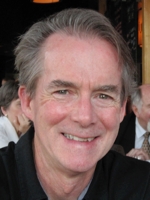
Spy Pond: Arlington, Massachusetts
--In the 19th Century Spy Pond was a source
for ice cut into huge blocks...
by Ed Meek
Ed lives in the Mystic River watershed just northwest of Boston.

It’s unnerving when shuffling
across the ice in early March
to feel a shift beneath your feet
and hear the aching crack
before you see the crooked rift
that cuts a seam between your legs.
You might have known it wasn’t safe.
You saw the melting at the edge
before you ventured out. You know
about the shifting seasons: shorter winters,
early springs, long summer months,
record heat and drought.
Just to be safe you best drop down
onto your hands and knees;
pray all the way to the shore.
© Ed Meek
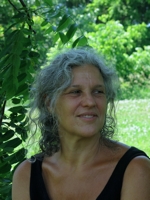
White Mare
by Gigi Marks
Gigi lives with her four children and partner on a small farm in the Finger Lakes, in Gayogoho:no—the lands of the Cayuga people.

This one is small, nine hands and no more,
with one black foot and three other white,
and when she runs high stepping in the deep
snow, it flies upward around like the ocean
waves in summer, like clouds quickly dispersing,
or just like more snow falling heavy,
and it will—filling in hoofprints, piling high
as the small white mare going back in the barn.
© Gigi Marks
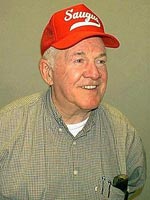
The Day Titanic Drowned
by Tom Sheehan
Tom lives in a house built in 1742 about 200 feet from the Saugus River in the Saugus River Watershed bounding 900 acres of the Rumney Salt Marsh and 450 acres of a wetland, Reedy Meadows.

We were sitting on empty nail kegs next to his icehouse on the edge of Lily Pond in Saugus, Doc Sawyer and me, talking about everything and nothing in particular. It was his way of communicating. In his gray felt hat, shirt collar buttoned but with no tie, Mackinaw open so I could see red suspenders clasped at his paunch, Doc always had time to talk to kids, dropping lore and legend in his wake. “Where you're sitting right now, son, is the geographical middle of our town. It's right under your feet, or,” and he chuckled, “under your butt.” I felt special, being ten years old, on the inside where real data was concerned.
He was full of tidbits like that. “Bazooka Bobby Burns scored the first touchdown on that field when it was dedicated this past fall,” he said, pointing across Appleton Street to Stackpole Field, re-dedicated in 1938, “and young Jackie Harrington scored the second one. You watch that young one now.” He could make declarations, too.
It was Saturday. It was cold again, as it had been for a good spell, and the ice cutting would begin today, the temperature holding below freezing for more than a week. On the pond the ice was over fourteen inches thick, thick enough to hold the small army of men soon to be on it. Morning light fell gray yet vivid across the face of the pond, and it raced off toward the island in the middle and the Turnpike beyond. It was a long skate from one end of the pond to the other. Some skating days it paid to bring lunch.
Crows were sending brittle messages to each other out across the frozen surface, over the cliff on Cliff Road, into the woods. Now and then I could hear the tires on a truck as it ran north to Maine or Canada on the Turnpike. Sounds ran over the pond as though they came through a funnel. Old Doc turned as he heard hoof beats on the pavement of Summer Street running alongside Stackpole Field. Like a drummer playing games, I thought.
The biggest horse I had ever seen in my ten years came down the street, and Mitch Crocker was guiding him with a set of long reins, not snapping them but laying them easy on that great back. That horse was so big it even made Doc stand up and take off his hat. He shook his head, light bouncing off his glasses, and said, “Where'd you come on him, Mitch? Win him in a game?”
Horses in those days always awed me, fearsome things, huge as boulders, with great teeth and hooves like catcher's mitts. Horses hauled milk wagons, and honey wagons, and now in winter the clumsy snow plows behind them, dragging on their muscles, calling on their hearts. This one with Mitch Crocker was a tower of an animal, dark chestnut in color. His teeth were yellow and enormous and now and then he'd pull his lips back to show them to you. Steam pulsed from his mouth like any other great engine of a thing.
“What's his name?” Doc said, laying a hand on the rippled neck, rubbing that fur coat smoothly, easily, talking another way, something closeted in his voice.
“I call him Titanic,” Mitch said, “though I don't expect him to answer none. “He don't happen to answer to any name unless he downright feels like it. So, names don't make any difference and one's as good’s another.”
“For the ship?” Doc said. The horse's eyes were a mix of lime green and yellow, and deep, as if he were reading my mind. I figured he had already read Mitch's mind. I looked away from those eyes.
“As well as any I could pick on, specially for size,” Mitch said. “It'll do until another comes along. This boy can take care of all your hauling today, Doc.” He patted Titanic on his broad chest. “Drag all the floes into place, get them up on to the ramp so's they can be cranked up and stored. Yes sir, do it all.”
For a few hours that Saturday I watched the strange army of itinerant ice cutters saw and chink up the ice of Lily Pond, saw Titanic with long chains hitched to his leather gear easily haul the huge cakes of ice to the slabbing point and transport up the chain-driven ramp to where they'd get buried under shavings and saw-dust. Easily and steadily he worked, the steam puffing in great clouds from his mouth and circling around his head like halos. Now and then, as if to reaffirm who was really in charge, he'd throw off a head-shaking command and bring attention to himself.
Never a sound came from his throat.
Throughout the morning old Doc Sawyer kept nodding his head, admiring that animal as if he'd never seen his like before.
Noon crawled toward us, still cold, still steamy about that great beast. Then the heart leap came and a fearful noise, a renting, a crashing. It was just before lunch when Titanic went down. I heard a yell, a scream, the unforgettable thundering noise as though a crack was going to sprint the length of the pond, and Titanic was in the water. In the deepest part of the pond. His legs thrashed at the ice, breaking off huge chunks, the noise like an enormous ice machine at work, like an icebreaker in frozen Boston Harbor I’d seen before. The ice under my feet shook.
The day stood still for me.
I'd never before seen a huge creature like him frightened, and his eyes said just that. They were like baseballs. Yellow-green baseballs, all wet and frosty, with tunnels behind them and all kinds of talk in them. He made sounds, too, desperate sounds down in his lungs, deeply bellowed sounds inside that huge canister of a chest and they came blurting out of his mouth along with the torrent of steam. Could have been grenades going off beneath the water.
Everybody leaped to grab chains and ropes, to pull that thrashing and ponderous beast out onto the surface of the pond. But the ice kept breaking under his hooves. And he tired and sank two or three times and came back up thrashing and kicking more, and the steam rising off his great back. The chains snarled and came caught up in ropes, and in his legs, I suppose. You could see the lines of them somehow get shorter and shorter. There was no slack in them at all. None of the men could steer or drag that ship of a horse onto the top of the ice.
Mitch Crocker, just before Titanic went down for the last time, dropped a length of chain from his bare hands. He blew into his cupped hands and tried to rub them. He was wet all over, dark stains growing across his clothes. His thick fur hat bobbed in the water. Then a last bubble came circling around it where Titanic's lungs had let go for the final time.
Doc Sawyer put his arm around Mitch's shoulders. “That was some animal, Mitch. I'm really sorry for your loss.” I remember thinking it was like standing in line at the funeral parlor. Everybody sad, their heads down, striking for one correct word, a passable word. Cold and quiet were twin elements around us.
In the water all the bubbles had gone.
Then, about five minutes later, itinerant ice cutters in odd clothes and knee-high leather boots and kids and on-lookers still standing quietly on the ice, about ten or twelve feet of chain, yet laying out on top of the ice as though remnants of a disaster, just slipped off the edge link by link and went down out of sight. Perhaps one last lunge by that great horse.
When all the noise was made about the movie of the same name in these recent years, I thought about the other Titanic going down. I remembered how quiet it was after, how cold, the last hunk of chain, getting dragged off the ice, still making a connection.
© Tom Sheehan
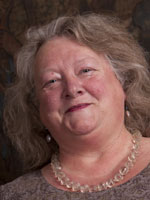
Particulate Matter
by Molly Fisk
Molly lives in the south fork of the Yuba River's watershed, about 50 feet from Rush Creek, which does rush in winter but is dry in summer, helping her remember that seasons change, disappear, are reborn, and so are we.

If all you counted were tires on the cars left in driveways
and stranded beside the roads.
Melted dashboards and tail lights, oil pans, gas tanks,
window glass, seat belt clasps.
The propane tanks in everyone’s yards, though we didn’t
hear them explode.
R-13 insulation. Paint, inside and out. The liquor store’s
plastic letters in puddled
colors below their charred sign. Each man-made sole of
every shoe in all those closets.
The laundromat’s washers’ round metal doors.
But then Arco, Safeway, Walgreens, the library —
everything they contained.
How many miles of electrical wire and PVC pipe swirling
into the once-blue sky:
how many linoleum acres? Not to mention the valley oaks, the ponderosas, all the wild
hearts and all the tame, their bark and leaves and hooves and hair and bones, their final
cries, and our neighbors: so many particular, precious, irreplaceable lives that despite
ourselves we’re inhaling.
Previously appeared in Rattle
© Molly Fisk
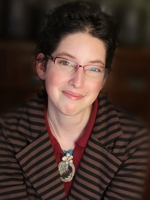
Rain
by Rachel Rose Teferet
Rachel lives in the Bear River Watershed, upon the banks of Wolf Creek, where she howls under full moons. She goes often to the Yuba River, where she drapes herself on sunny rocks and writes poetry and romantic comedies in the shade of the willows.

on a day
that has not stopped
raining for weeks
one day spanning
every day of hidden
sun. The roads
buckle
the mine shafts
collapse
revealing swiss-cheese
cavities where the gold
should have been
but now only empty
tunnels like prolapsed
arteries thick with
mercury arsenic sludge
and the ghosts
of crazy white men.
© Rachel Rose Teferet

Back from the Brink
“In nature nothing exists alone.”
— Rachel Carson, Silent Spring
by Kathe Palka
Kathe lives in the Raritan Basin on a small bluff overlooking the South Branch of the Raritan River, just west of the confluence, where she occasionally sees bald eagles.

Since summer on my walks along the South Branch of the Raritan River I’ve heard the occasional calls of a bird I can’t identify. Each time I see nothing unusual in the neighborhood. The voice is exotic to me and I wonder more than once if it might be an escaped pet. How long could such a bird survive?
mid-winter morning
along the riverbank
eagle chatter
Finally in late January, walking down my driveway to the mailbox, I hear it again and am astonished at what I see across the road from my house on the river. The same week I spot their nest just a bit downriver atop a high tension tower. I’m so excited I drive to the county park office to speak to a naturalist. He’s well aware of the pair and asks me to report any unusual activity I might see, particularly harassment by humans.
snow falling
on a sycamore limb
two bald eagles
I’ve since learned that after the banning of DDT the number of breeding pairs of bald eagles in New Jersey rose steadily from 1 to over 150 known pairs currently. Several miles downriver from my home another pair nests in a park under the watchful eye of a live camera feed. Sightings of the local nesting pairs and juvenile birds have become a joyous, frequent occurrence for me.
chill wind
trailing downriver, the peal
of an eagle
First appeared in Contemporary Haibun Online.
© Kathe Palka
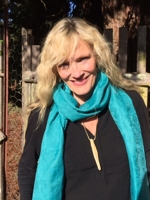
First Snowfall, Taos
by Devreaux Baker
Devreaux lives on the coast of the Pacific Ocean in the Big River Watershed.

Snowfall in Taos and I go back
to the underside of things
as in roots tightly bunched together
becoming small fists praying
for the first spring flush
to open their hands again
I go back to rock and pebble
on the trail up the mountain
filled with abiding grace
I stand in the first snowfall
and feel the great wheel turning
that means our lives are in conjunction
and soon we will seek each other out
in winter’s silence while the first snowfall
drifts like a veil of forgetting
across the face of the land
To speak of the first snowfall in Taos
is to speak of wild ponies grazing
on all the high mountain passes
of my heart
where I find silver sage
transformed into guardians
of the long reaches of horizon
and conjure amulets for the brave
who carry the shhh shhh shhh song
of first snow inside their hands and hearts
and legs
uncovering truth in the heartbeat
of wilderness so all doubts
about how to be one with earth
scatter like winter leaves
in wind.
Previously published in author’s collection, Hungry Ghosts, 2018
© Devreaux Baker
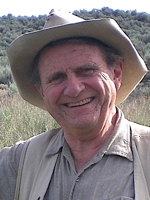
The Animals Are Talking
by Grant Jones
Grant lives in the prairie of North Central Washington where orchards and foothills intermingle at the mouth of the canyon of the Little Mosquito, one of the tributary watersheds that feeds the Okanogan River basin of the Columbia River Big Bend.

Walk out past the barn to the spillway,
where Bobcat crossed the creek last night;
her tracks curve through the aspen glade,
skirting past the homestead iron pile,
then veer up the dugroad grade
we restored to the pocket-bench
on the shoulder of our Pack Pony Hill,
up where we carried that loveseat and two chairs
to watch the sunsets that shimmer out the river bend;
that was last summer before those talking heads
started lying like scheming magpies.
Bobcat’s prints were close spaced
as she walked out there slow in the moonlight,
driving crazy our dog “Wolf,” to growl and bark,
to guard the house where we slept
on our hot-granite slab by the fire
under a hand-tied comforter;
Bobcat was tracking a snowshoe rabbit
who foraged on little Saskatoon buds,
fir needles and stems of Sagebrush Buttercups,
under this long December Cold Moon.
America was shuddering in its longest night.
Now follow my tractor tracks
behind the house up the Pine Trail Road
where mulleins lie like shadows under the snow,
felled by Chong-hui’s razor sickle,
next to the clumps of yarrow and lupine
where bluebells and spring beauties
poke through the snow, waiting.
Coyote came down off Watch-over-us Hill,
stood where you’re standing, thinking
Everything is connected, though most
of you seem tied only to each other,
and fewer and fewer to Earth.
Coyote Springs, Mouth of the Canyon of the Mosquito at Ellis-Forde
12/24/2016
© Grant Jones

Geese
by Robert Fillman
Robert lives in the Lehigh River Watershed in eastern Pennsylvania.

Gray geese traipse
across a gravel road
in the middle
of Pennsylvania farm country
beneath the bluest sky
after a morning snow.
No debates, no crowding,
high necks poised,
their webbed feet weaving
the tapered arc of a sigh,
they saunter in silence
toward the edge of fields
along a barbed wire fence
searching for water.
In winter's still ordinariness,
a clean life flares
from their velvet wings,
the sleek curve of beaks,
until the suit
in the SUV behind me
lays on the horn
and they flap
in all directions,
frantically crying as they fly,
a spectacular fire waking the air.
© Robert Fillman
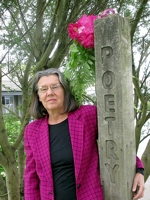
Weather Station on the Coast
by Ann Spiers
Ann lives on Puget Sound in Vashon Island's Ellisport Creek watershed.

We forget how a sea can be.
No wind to tap the waves into crests.
No crests to break on the steepening beach.
No northering velella towing spring.
© Ann Spiers
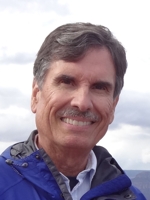
Humble Homily
by Michael Lyle
Michael lives in the North Fork Goose Creek watershed near the Blue Ridge Mountains of Virginia.
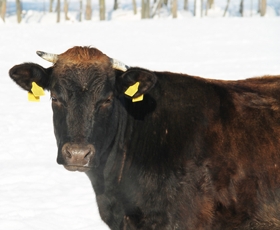
the promised snow
falls on fields
behind my house
nine black steers
ease together
like pilgrims
to evening fire
the once stark forms
an ebony flow
on brightening ground
© Michael Lyle
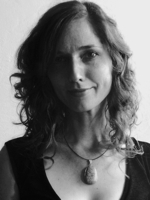
Impenetrable
by Ellie Rogers
Ellie lives a few miles from Bdote, the confluence of the Mississippi and Minnesota rivers in Mni Sota Makoce, land of the Dakota.

As nights lengthen,
caribou hooves harden
to crater tundra
and unearth lichen
growing below snow still,
stiff like abandoned antlers.
Now, rain on snow on snow
traps sustenance under untappable ice.
Their whole range
beyond their reach.
Nomads’ midwinter lullaby
frantic, stamping reindeer.
Left foot, right foot,
the dwindling ribs between
81,000 sets of hoof-prints, empty
quotation marks waiting for the right words.
In a photo from Siberia, a circle
of caribou collapse into each other,
their bodies like petals of spring
sedges unfurling too early,
their fur like tufts of cotton grass.
Snowdrifts bury their edges.
Their mouths open as if moss will drop
from another realm for them,
or perhaps they were lowing as they froze.
Qalipu means snow shoveler in Mi’kmaq.
Their bodies were made for this,
not for what we’re making of this earth.
© Ellie Rogers

Inversion
by Ellie Rogers
Ellie lives a few miles from Bdote, the confluence of the Mississippi and Minnesota rivers in Mni Sota Makoce, land of the Dakota.

In kindergarten, we plotted paper lions
and lambs across the month of March.
A parade of fierce, fierce, fierce. A gentle ending.
This February, snowdrops rise
from snowless ground. A blossoming
over starred land. Lenten roses herald
the errant lamb. The buds, young
and impatient – who could blame them? –
plotting lamb, lamb, lamb, bloom.
I almost lie down in greening pastures,
as if swift melt gentling tawny fields
always merits a hallelujah.
As if April. As if an ordered wheel
of constellations across untouchable sky:
Leo then Aries rising. Resurrection of air
warmer than breath. Shutters trying to fly.
At night, wind wraps me in something like a ghost
giving up. I dream of losing my hands.
A false spring. Peach buds trusting melt
now shrouded in morning snow. Crocuses open
and frozen at the foot of our wood pile.
© Ellie Rogers

First Words
by Deborah Kennedy
Deborah lives in the Guadalupe watershed in the South Bay area of California. She often hikes in an urban riparian corridor where she spots osprey, hawks and herons. In the evening she watches for moon bows, earthshine and other modern miracles.

The first words spoken by humans
echoed the sounds of that seething world
coyote’s sad songs of lust and blood
wind slipping through last year’s grass
the herd’s hooves beating against parched ground
the crack and spit of wood in the fire
thunder’s rolling drumbeat and staccato rhythms
the shock of rain against each leaf.
Our tongues found the form and rhythm
singing songs by a swinging cradle
to tell tales in flickering firelight of a
breathing world, pressed hard against the dark.
First published in First Literary Review-East.
© Deborah Kennedy

Unseen
by Deborah Kennedy
Deborah lives in the Guadalupe watershed in the South Bay area of California. She often hikes in an urban riparian corridor where she spots osprey, hawks and herons. In the evening she watches for moon bows, earthshine and other modern miracles.

White mist low
in the valley, a
raindrop, the whisper
of Western Hemlocks.
The air you are
breathing.
The ocean’s
deepest current
the frozen lake’s
quiet bed, your
still heart. The water
you are drinking.
The nerves of
your spine, roots
of your teeth, your
brain’s eager
flux. The apple
you are biting.
Unmoving, icy
eyes. All that
is unseen, unfelt
abused and ruined.
The air you are
breathing.
© Deborah Kennedy
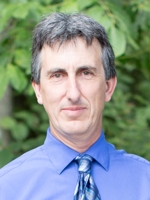
Ice Remembered
by David Ek
David currently lives along Virginia's Cedar Run, a tributary to the world-renowned Chesapeake Bay watershed.

The vast expanse of polar ice may conjure images of a bleak and foreboding lifeless expanse or perhaps a frozen nothingness backdrop to a perilous sci-fi adventure. This landscape is so disjunct from our normal world experiences and perceptions that it is probably easier to visualize life on Europa than in these Terran wastelands. In the mind’s eye, this wildness is unlike the inviting forested wilderness of the familiar lower 48. However, as is often the case in the natural world, reality is closer to science fiction than our antiquated imaginations can penetrate or perceive.
None of these thoughts were on my mind, years ago, as I was penetrating deep into the heart of the North Cascades Range of Washington State. It was there, on this dim and overcast spring day, that a brief encounter with ice worms on subarctic glacial ice first piqued my awareness of life in ice. There truly is a worm species that lives its entire life within glacial ice. I later found out that they do not often surface. Apparently, the environmental conditions aligned just right for them to arrive at the top of their world and I at the bottom of mine—at that specific time and place. Later, my curiosity led me to find out what other life forms live on the edge.
Scientists’ knowledge of life in extreme environments has exploded in the last couple of decades. Their discoveries have opened minds to the abundance and variety of life forms that even science fiction writers barely imagined—wildly more exotic than the lowly and pedestrian ice worm. Intrepid investigators have found tiny algae, diatoms, and crustaceans in interstitial spaces buried deep within polar ice; not just a few scattered individuals, but a rich trove of microorganisms that sustains global life processes.
Whether carpeting the underside of sea ice or buried deep within icy chambers, Arctic microorganisms provide the subsistence for krill and clams. Krill and clams feed arctic cod, which nourish walrus and narwhal, and these in turn feed polar bears. This overly simplistic food chain depiction does little justice to the complexity of biological processes that have developed over eons. This interconnectedness, and those in the Antarctic, go beyond the confines of the Polar Regions—the reach is global.
Planetary oceanic currents transport rich nutrients to the far recesses of the Earth. Not only does this transport mechanism include horizontal circulation of oxygen and nutrients, but sinking and upwelling circulation adds a vertical dimension. Temperature differences between the warm tropics and cold Polar Regions drive this conveyor belt. This in turn influences atmospheric processes such as the Jet Stream. Even remote air masses are highly influenced by solar radiation reflecting off polar ice. Without these global systems, northern areas that were warm may cool, southern areas that were cool may warm, and biological hot spots, including commercial fisheries, may move. Even small system changes may trigger global paradigm shifts such as magnetic pole reversals, global climate change, mass extinction, cessation of the Jet Stream and Trade Winds, and sea-level rise, in other words, a cascading series of radical global disruptions—many of which human societies perceive to be critical to their health, geopolitical strength, economy, and way of life.
Not everyone who grew up in Arctic cultures can articulate fully the scientific basis of these global processes, but they know it intuitively. These people often have a deep understanding of the pulsating rhythms of life surrounding ice. They understand that the ever dynamic but dependable ice is the life-blood of not only the Arctic but also of their life, culture, identity, and soul.
As I delved deeper into these mysterious worlds, I was reminded of the famed anthropologist Franz Boas. While spending time with the Inuit of the Canadian Arctic, he marveled at the number of words that Arctic cultures had for snow and ice. This may indicate the importance that snow and ice play in their life, for each separate term describes a significant yet subtle characteristic that to other people is simply ice or snow. Such is the state of people disconnected from the complex real world.
The real world of an ice climber is usually confined to the narrow field of vision necessary to decide where, in intense concentration, to sink crampon spikes into the right icy nook, or where to guide the graceful swinging arc of the ice hammer to form the best bite. Because of the importance of ice to an alpinist, they too have many words or modifiers describing the physical characteristics of ice. For instance, cold temperature forms "brittle ice," which can easily splinter and shear the climber's bite, which in turn enables gravity to deposit the offender in a cloud of spindrift at the icy bottom. Another type of ice that climbers find undesirable is "punky ice." My personal favorite climber-coined ice modifier is "cheesy ice." Good clean ice forms a solid bite for crampons and ice tools that hold you firmly and safely to the mountainside. Imagine how secure you would feel if the hold that you were trusting your life to had the consistency of soft cheese.
If your life depended on the type of ice encountered, perhaps you too would use a variety of names to describe ice. Because subtle environmental changes can dramatically alter the characteristics of ice, some climbers believe that the many forms of ice reflect the ice's specific whimsical personality, and that, as with any other whimsical being, that mood and personality can turn at any given moment. Therefore, for many ice climbers and alpinists, a climb may become a personal relationship between human and ice, and for any relationship to flourish, each party must fully understand and appreciate the other.
Although an ice climber's lexicon may be crude compared with the rich Inuit languages, both emphasize the importance that subtle environmental, weather, and climatic changes can play in determining the characteristics of snow and ice. These changes can extend from the narrow confines surrounding the pick of an ice axe to entire landscapes, and even interlink into one integrated global climatic system.
It is startling to compare modern-day and historic photographs of polar and glacial ice. Pack ice is not as expansive as it once was; therefore, the ice-free waterways are opening the Arctic to expanded oil and mineral exploitation. Ice shelves are breaking apart and cast adrift. Mt. Rainier's Paradise Ice Caves hasdisappeared, as will soon all the glaciers within Montana’s Glacier National Park. Such changes are happening faster than most scientists predicted.
Reflective ponderings on historic photographs of the Earth’s once mighty “permanent” ice may one day be comparable to looking at historic sepia prints of long-dead relatives and casual friends from by-gone eras. There may have been many wondrous stories of this mysterious world left untold and never captured on a single photograph—simply lost in time. Who would have thought that my realizations and ice-awakenings could have originated from the chance encounter with a worm?
Clearly, there is more than one way to use, and value, ice. Perhaps the majority of us, although far removed from the Polar Regions and magical icy realms, will one day appreciate the importance and fragility of ice, once it, like our casual friends captured on smudged sepia prints, is long gone and its many distinct and fascinating traits faded from memory.
© David Ek

Breath
by Victoria Crawford
In the forests and rice paddies watered by the Mae Ping in a Lanna valley of north Thailand, Victoria lives with three dogs, one cat, her husband, and her garden (as everything grows here like crazy). Her weather is brought in by the Tibetan massif and the South China Sea.

Breathe in, inspiration,
expiration, slowly let it go.
Enjoy the echo of a second breath,
gift of the sea, giving oxygen,
ocean’s unseen phytoplankton,
CO2 in, O2 out.
Visible fish surface float
dead east of Mexico,
Poseidon’s largest death zone.
Mississippi southward souring:
fertilizer, pesticide, animal waste
industry, city, humanity garbage
nutritious broth for hypoxia,
CO2 in. Zero out.
Caribbean turpentine,
oxygen remover,
dead zone maker
Breathe in, breathe out.
© Victoria Crawford
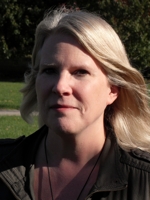
Significance of Planetary Flatus
by Laura Grace Weldon
Laura lives on a small Ohio farm where rain rushes toward Little Sweetly Creek, enters the Black River, merges with Lake Erie, and then the St. Laurence River on it its way to becoming the ocean.

It is called The Great Dying.
250 million years ago
(only seconds in Earth's long day)
90 percent of all species perished.
It's blamed on gas.
Eon's amnesia hides certainty,
yet experts say our verdant Earth
was broiled and poisoned
by these likely suspects:
1. Methane clathrate,
known as "fire ice"
(hat tip to Robert Frost).
2. Massive volcanic eruptions.
3. Asteroids slamming into
shale deposits, instigating a sudden
Permian-Triassic fracking.
Now, research incriminates
one-celled Methanosarcina.
It bloomed across oceans,
converting marine carbon
into so much methane
the weather broke.
You who insist humans
can't change the climate,
consider this microbe.
It waits on the ocean floor.
It waits in your convoluted guts.
It asks you to remember.
Last time
our blue green world
needed ten million years to recover.
© Laura Grace Weldon
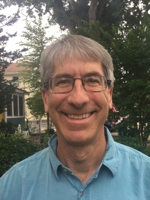
Environmental Dilemma
I arise in the morning torn between a desire to save the world and a desire to savor the world. This makes it hard to plan the day.
E. B. White
by Dan Kriesberg
Dan lives on a peninsula between the Long Island Sound and Mill Creek on land that was once an asparagus farm.

The beauty of knowing and caring about the natural world is being a witness to its wonder. The sadness of knowing and caring about the natural world is being a witness to its destruction. During the same walk in the woods I can marvel and find comfort watching a chipmunk gather acorns and despair at the Asian bittersweet pulling down the red oak trees. I can watch a wood thrush migrating north, knowing my membership in the Adirondack Mountain Club helps protect its nesting habitat and at the same time question how the bananas I buy cause deforestation of the thrush’s winter home. An awareness of inter-relationships shows me the connections that both harm and help. The awareness of these interrelationships tells me the truth of what is going on.
My high impact lifestyle is not designed for long- term environmental sustainability. Given the state of the environment, I maintain an immoral way of life even if I tie up the cardboard and put out the glass and plastic on Thursdays or buy most of my pants and shirts at the Boys and Girls Club Clothing Sale. There is a ridiculous number of problems, with new ones on the horizon, all of which arise from human actions and inactions. It is so easy to do harm, how can I do right? The dilemmas are daily. Even the food store is a nightmare. Is it better to buy organic bananas wrapped in plastic or the regular ones that are not? What kind of eggs are the best to buy? Is it okay to eat flounder? Even when I want to do more, it is hard to know what actions are the most important and which actions to take. A cradle- to- grave analysis for each purchase or action, while useful, would just not work while standing in aisle 8 of the Stop and Shop. Plus, when extra time presents itself, I admit I would much rather take a hike than write letters to my congressional representatives, research the cost/ benefit ratio of putting up solar panels on our house or organize a fundraiser for the Sierra Club.
Here on the north shore of Long Island where the population of televisions and computers per household vastly outnumbers people and it is one of the only places on earth where my house would be considered small, it is easy to rationalize my actions and be a moral elitist by telling myself I do more than most. But do I stop flying out West for backpacking trips? It is time and money, not carbon, that limits my trips. I’d like to be a more responsible planetary citizen, but at what point do I really put my ecological footprint ahead of my suburban lifestyle? Even if I am personally willing to live with less, how much do I ask of my family?
When Scott was 11 he used his Christmas money to buy an Xbox gaming system. That meant he needed a TV. I managed to find a free one before our neighbor threw it out. It lasted a year or so. But when it died, I couldn’t convince Scott to let me find another free one. “I want a flat screen, and I have enough money from my birthday” We were off to Best Buy. Surrounded by electronic access, I was twitching. Finally, he settled on one of the cheaper models, a small victory but a victory nonetheless. It is one thing to say no a child’s request because of money or age appropriateness but another to say no “just” for environmental reasons.
“We are not buying a flat screen because I have a friend that will give us one for free and a new one would be a waste of resources.”
For years we have tried to have a somewhat perfect suburban lawn. Karen has created a beautiful garden and understandably would like a lawn to match. The organic method has not worked and the crab grass comes back each summer with a vengeance. I can see why Karen would like a lawn that does not turn brown in August. She asked if we could try an herbicide to kill the crabgrass. My first reaction was No, this is where I make a stand. But then I thought, Maybe just one application and we could at least get a head start on getting rid of the crabgrass, how bad could it be? It helped a little but crabgrass is tough.
Once, when my brother and I were backpacking in Yosemite, we climbed above 10,000 feet. At that elevation no campfires are allowed. In those days I did not have a stove and cooked over a campfire. I was tired and hungry and said we should just make a fire; there was no one for miles. Joe responded, “If we don’t follow the rules, who does?” We hiked down. We need to live as if the mountains are watching us.
I wonder how it would go if I made these new rules for the Kriesberg household?
- We are only going to have one car.
- We will only eat organic food and become vegetarians.
- We are not going to have a dog but instead save the money for our family charities.
- All investments will be with socially responsible mutual funds.
- We will only wear secondhand clothes.
- No shower will be longer than three minutes
- Relatives will be encouraged to spend less money on gifts for birthdays.
The boys’ rooms were filled with plastic, and wish I had said more often, “Just because you have the money doesn’t mean you need to spend it.” It would be good if the boys were uncomfortable sometimes. It would be good if we all were.
One answer is not to focus on how a more sustainable lifestyle limits us but to focus instead on what an environmentally sustainable lifestyle can do for us. Instead of saying Don’t to X, let’s say Do Y instead. Motivating people would be easier if the emphasis were put on what we can do instead of what we should not do. This would hold for political decisions as well. Instead of saying no to housing developments, it would be yes to land preservation. Instead of no to regulations, yes to more clean water. Instead of no to pesticides, yes to safer lawns.
The problems are deeply- seated and pervasive, which makes taking action overwhelming. But inaction is not the answer. When Zack was little, nap time was chore time for me. I would get him to sleep and quickly go and get something meaningful done. When it was close to his wake- up time, I would say to myself, “Why bother getting started on another chore when Zack is about to wake up?” I’d half start something or just putter around. Finally, I realized that I was wasting a lot of time that could be productive. Even if there was not much time, there was still time to get something done. If Zack woke up I would stop, but at least more was done than if I had never started. This line of thinking doesn’t just apply to chores. Ten minutes of exercise is better than no exercise, ten minutes of writing is better than no writing. Ten minutes of environmental action is better than none.
I carry on with my rituals, as small a contribution as they may be. The wax paper from cereal boxes is good for wrapping sandwiches. Those plastic bags from the newspapers are good for cleaning up after the dog. There is some satisfaction in calling mail order companies and asking to be taken off their mailing lists. When opportunities to do good works present themselves, I try to grab them.
The unease that I am not doing my share still remains.It is hard not to think I am just rationalizing that small acts are meaningful because I don’t want to make true sacrifices. I want to believe that I am doing my share. Of course I could slow down my suburban life marathon to have a vegetable garden, an electric car and solar panels.
It would all be so much easier if there were a set amount each person should do. That way I could put in my dues and be guilt free and at ease. We are all a little like the students in my classroom who ask, “How many pages does it have to be?” For now I do some things, try to do a little more, and by trying to make changes at work, I multiply the impact of my actions. It helps to keep the faith and hope that the planet is more resilient than we think. Still I am also torn between pessimism and optimism. Like so many things in life, it is a work in progress.
© Dan Kriesberg
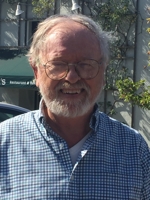
Kindness
by Bruce Hawkins
Bruce lives between the Cerrito Creek and Baxter Creek watersheds near the eastern shore of San Francisco Bay.

Oil drips in the dark pit.
Like nervous sweat the wet
patch widens and I drop
in the match, watch it catch,
the flames low, slow, creeping
then a batter of wings.
I clang the door shut
against what is leaping
at me, look that no feathers
have fallen to the floor.
This is kindness which, kept
in its cast iron cage,
warms the small house, allows
me to undress, listen
to the midnight wind, sit
complacent as a rose,
while it exacts a price
so small I hardly notice.
© Bruce Hawkins

Washed Ashore
by Bruce Hawkins
Bruce lives between the Cerrito Creek and Baxter Creek watersheds near the eastern shore of San Francisco Bay.

The sand tormented stingray lies
up near the logline,
a smoldering necktie,
a suffering piece of geometry.
We walk the shortest distance
away from it
into a black-red slab of sunrise,
liver on butcher paper.
This, of course, is only the world
as I am seeing it,
overstated, and colored
by what seeps
from the cracks in
our conversation.
I must stop and clear my eyes
of this
crude accuracy.
All around us, pieces
of jellyfish lie spattered, as if
some god just sneezed.
© Bruce Hawkins

There's No Place to Go
by Bruce Hawkins
Bruce lives between the Cerrito Creek and Baxter Creek watersheds near the eastern shore of San Francisco Bay.

The birds fly and land and fly
and light on wires and fly.
Small birds, they scratch
around and bicker under
the sparse hedge. There’s
nothing to do. They are
little streaks and passages
of brown and black with
pencil colored beaks.
They live near
the cafeteria, almost
all they do is eat,
yet Lesbia supposedly
loved one dearly. Why not,
one time, be this easy
on each other?
© Bruce Hawkins
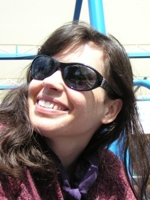
California Pastoral
by Beth Suter
Beth lives in the lower Putah Creek watershed where it empties into the Sacramento River Basin directly under the Pacific Flyway.

we tried to edge the lawn, pruned
and raked ourselves tidy
I don’t remember when we stopped
sweating to make the yard
into what we thought it should be
whatever’s left out there now
is wild and takes care of itself
we lost the plum tree to drought—
woodpeckers turned the husk
into a home
© Beth Suter

Osprey at Bass River
by Sara Letourneau
Sara lives in the Charles River watershed in southeastern Massachusetts. She also frequents the Cape Cod watershed to visit family and take in the beaches, marshes, wildlife, and other natural wonders of the region.

Look at how it stands tall at its nest,
a watchful sentry, quiet until
it opens its black, hooked beak and chirps
its kettle-whistle call. When it alights,
the thrash of its wings is palpable,
a heartbeat in my ear.
And look how it flies!
With its brown wings bowed, its primary feathers
splayed like fingers, its white crown
and vest on proud display. Its golden eyes
fix upon the water below
before it hovers, briefly but patiently,
then dives cliff-steep, feet first,
shattering the surface with a splash.
And as it rows itself upright,
climbs into the air with a fish in its talons,
its poise does not falter
and the tempo of its flight,
a keen and vicious pulse, does not slow.
This hunt, this knowing that something
is about to die, should make me flinch,
and yet the act is so graceful,
so flawless, that I cannot look away.
How does such a thing exist?
A raptor that is wilder than a dream
does not frighten me, but rather
swoops into view and snatches my breath
the way it would snatch its prey.
Then again, the world is bursting
with contradiction.
Darkness cannot be without light,
love without hate, death without life.
And here is this king of the river,
this artful thief,
taking what it needs to survive
and leaving a gift in its wake.
© Sara Letourneau

Attention
by Lucy Griffith
Tucked within the Edwards Plateau, on a songbird flyway, Lucy sleeps 100 feet above the Guadalupe River on a ranch: home to bobcat, fox, turkey, armadillo.

Home— the place of attention.
Where you know that swirl in the road
marks the dust bath of a jackrabbit.
Or that a particular Canyon Wren ends
her descending aria with a startling yee-haw.
That on our longest of days,
the sun retires on the breast
of the northwest horizon
and begins a steady southern swing
to the little knoll where we mark its winter twin.
Our lives held in this gentle cup,
palmed within an arc of light.
© Lucy Griffith
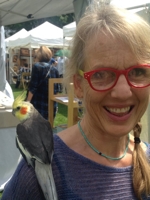
On the Way Home
by Victoria Shippen
Vicky grew up on the ocean learning the ways of weather, tide, animals, woods, seasons. She became a watcher of the minute inflections of nature. She lives in the woods on a small quiet lake in Massachusetts accompanied by two small dogs, one giant cat, and a fleeting great blue heron.

small night, simple road, loud star light
cars lope along straggling, thoughts
merge with night hungers
spangled bits of plastic cover the route
in the center, a deer spans two lanes, a buck,
legs folded as if bedded down for the night
his tree of antlers claim the sky
no other cars yet, no witnesses
it’s midnight
my car in awe, five feet from him,
flank and torso solid, bold, whole
his form perfect
alone, body stilled
his eyes can move,
rimmed in soft black, they glance this way and that,
his pink tongue slides out, in, slowly
thick, testing
I could not carry him,
put him in my car,
take him to safety, a vet, a hospital, my home
set my car in front of him, spare him
from another car that wouldn’t stop
give him time to stand up, go, blend into the woods.
the ways I tried to save my father.
© Victoria Shippen
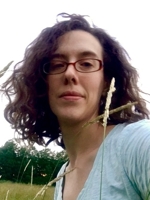
These Violent Delights Have Violent Ends
by Caitlin Gildrien
Caitlin lives on traditional territory of the Abenaki at the feet of the Green Mountains, on sandy loam that was once the bottom of an ancient sea.

I don't want to write
about California. I don't want to look.
Did you know there were two new litters
of mountain lions in the Santa Monica mountains?
Mama can only carry one at a time. I don't know
why that's the thing that breaks me. It's the world
that breaks me. We've broken the world.
Just past the tweet that tells me about the kittens
is a thread about Romeo and Juliet,
the Claire and Leo movie version,
and that is what I click through. How I loved that movie,
the fishtank, the kissing. I wanted to live
in a world like that, a world like this world
except slant. Better lighting, better language.
How you can understand it best
by not listening too closely. I think too much.
All the fish in that tank scooped probably from the sea;
how the sea is failing. I wanted to love someone
until they would die for me. I wanted to be the one
they would choose to carry out of the burning world.
When the fish stocks fail, when the Amazon tips
past the point for which it can compensate
with the meager reforestation it is allowed –
there should be nicer language for this in a poem,
I’m sorry. I just keep thinking of Juliet, who thought the sea
was infinite and so a good metaphor for love.
But we’re determined to find the bottom
of any bounty. They thought this continent
was boundless, too, and scraped it clean
to prove themselves its better. They.
Did you see that storm of smoke,
utterly apocalyptic, over the highway?
It makes a person say God. God, lift me
by the scruff. Or the throat, maybe.
All of us, maybe. Shake hard.
Be rough with love.
Previously published in Rattle.
© Caitlin Gildrien